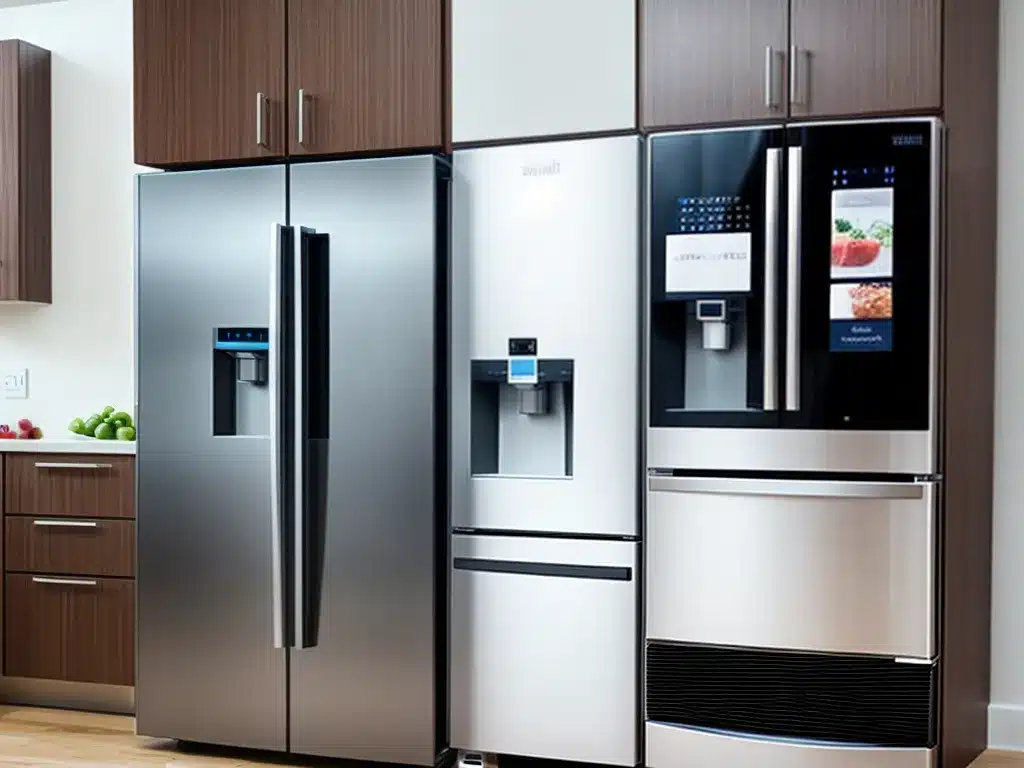
Introduction
Smart fridges have come a long way from simply keeping food cold. With advanced features like touchscreens, cameras, voice control and integration with other smart home devices, smart fridges are transforming into sophisticated appliances that aim to make life easier and more convenient. In this article, I will provide an in-depth look at the capabilities of modern smart fridges, their benefits, and how they can be useful additions to today’s connected homes.
Key Features of Smart Fridges
Large Touchscreen Displays
One of the most noticeable features of smart fridges is the inclusion of a large touchscreen display, typically 10 inches or larger. This allows you to interact with the fridge visually, seeing information at a glance like the internal temperature, calendar, recipes, and digitally add items to the grocery list. Some models even support watching videos or streaming music when cooking in the kitchen. The screen turns the fridge into a hub for the kitchen.
Internal Cameras
Internal cameras are another big advancement in smart fridges. By scanning the contents of the fridge, the camera can detect what foods you have. This enables features like generating a grocery list of items you are running low on or warning you when food is about to expire. Some models can even identify foods and track nutritional information. The camera provides a helpful perspective into exactly what’s inside.
Voice Control and Assistance
With built-in microphones and voice control, many smart fridges allow you to interact hands-free using a voice assistant like Alexa or Google Assistant. This allows you to add items to your grocery list, set reminders, play music, hear the news, and control other smart devices in your home completely hands-free. Voice makes the fridge more convenient when cooking.
Smart Home Connectivity
Smart fridges often integrate with other smart home appliances like your smart oven or smart scale. This connectivity between devices enables useful features like automatically preheating your oven based on which foods you remove from the fridge or providing cooking instructions on the fridge’s display. It creates an ecosystem of appliances working together.
Benefits and Uses of Smart Fridges
There are many benefits to owning a smart fridge beyond just keeping your food cold:
Simplified Meal Planning and Grocery Shopping
With food tracking and grocery list features, smart fridges simplify meal preparation. You can plan recipes based on foods you need to use up, and the fridge helps ensure you have the necessary ingredients by adding them to the grocery list. This takes the guesswork out of keeping your fridge stocked.
Reduce Food Waste
The cameras and sensors inside a smart fridge help reduce food spoilage and waste. By tracking expiration dates and what produce you have, it can recommend recipes that use foods that need to be eaten soon. The fridge even reminds you of expiring items so you consume them in time.
More Connected Kitchen Experience
With their touchscreens and smart home connectivity, smart fridges allow you to access useful information while cooking like controlling music playback, watching cooking tutorials, and controlling your smart oven or cooker. The fridge becomes your kitchen command center.
Energy Savings from Improved Efficiency
Some smart fridges use advanced compression technology and sensors to optimize cooling and track usage patterns, helping improve energy efficiency compared to traditional models. The new hardware improves how the fridge runs.
Enhanced Organization
Between cameras tracking food locations and the touch display arranging items logically, smart fridges help you stay organized. You spend less time searching for that leftover or digging behind items. Organization is improved.
Key Considerations Before Buying
While smart fridges offer exciting new capabilities, there are some downsides to be aware of:
-
High upfront cost – Modern smart fridges typically cost much more than basic models, sometimes 4x as much. The high-tech features come at a premium.
-
Shorter lifespan – With more electronics and moving parts, smart fridges may not last as long as simpler models, perhaps 5-10 years compared to 20+. More can break.
-
Privacy concerns – The cameras inside, while useful, also introduce privacy worries and fears of hacking. You’ll want to research security measures.
-
Learning curve – Making the most of a smart fridge’s features takes time. And problems with the software may require troubleshooting. There’s an adjustment period.
If these downsides seem acceptable to gain the advanced capabilities, then a smart fridge may prove worthwhile. But weigh the pros and cons carefully for your needs.
The Future of Smart Fridges
As smart home technology matures, where might fridges go in the future? Some possibilities:
-
AI-powered cooking assistance – Using food recognition and AI, fridges may one day suggest recipes, walk users through cooking steps, and answer cooking questions.
-
Expanded dietary tracking – More advanced cameras could track nutritional info for all foods, allowing complete dietary logging and integration with fitness apps.
-
Automated grocery shopping – Smart fridges may link up with grocery delivery services to automatically order items you’re running low on. No more grocery lists required.
-
Wider smart home ecosystem – We’ll see deeper connectivity between fridges, ovens, microwaves, counters, and more for a completely automated kitchen.
While some of these capabilities feel futuristic, smart fridge technology is rapidly evolving. But even what’s available today provides useful features to simplify cooking and cut down on food waste. For those seeking more connectivity in the kitchen, smart fridges deliver helpful benefits beyond just refrigeration. They represent the next evolution of the common refrigerator.












